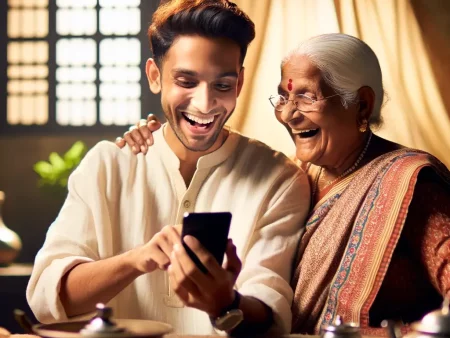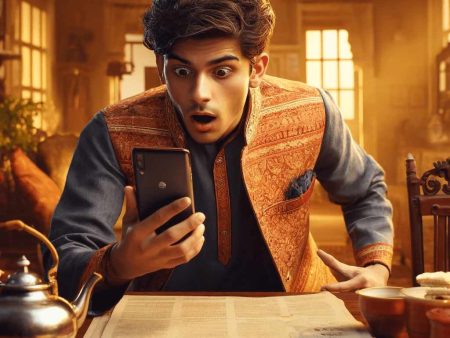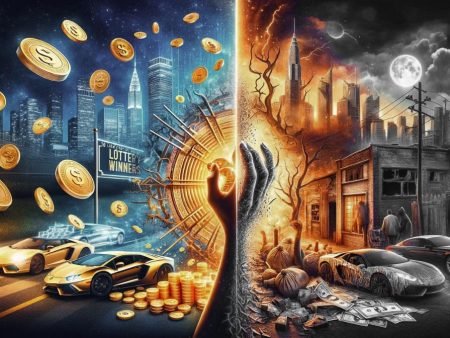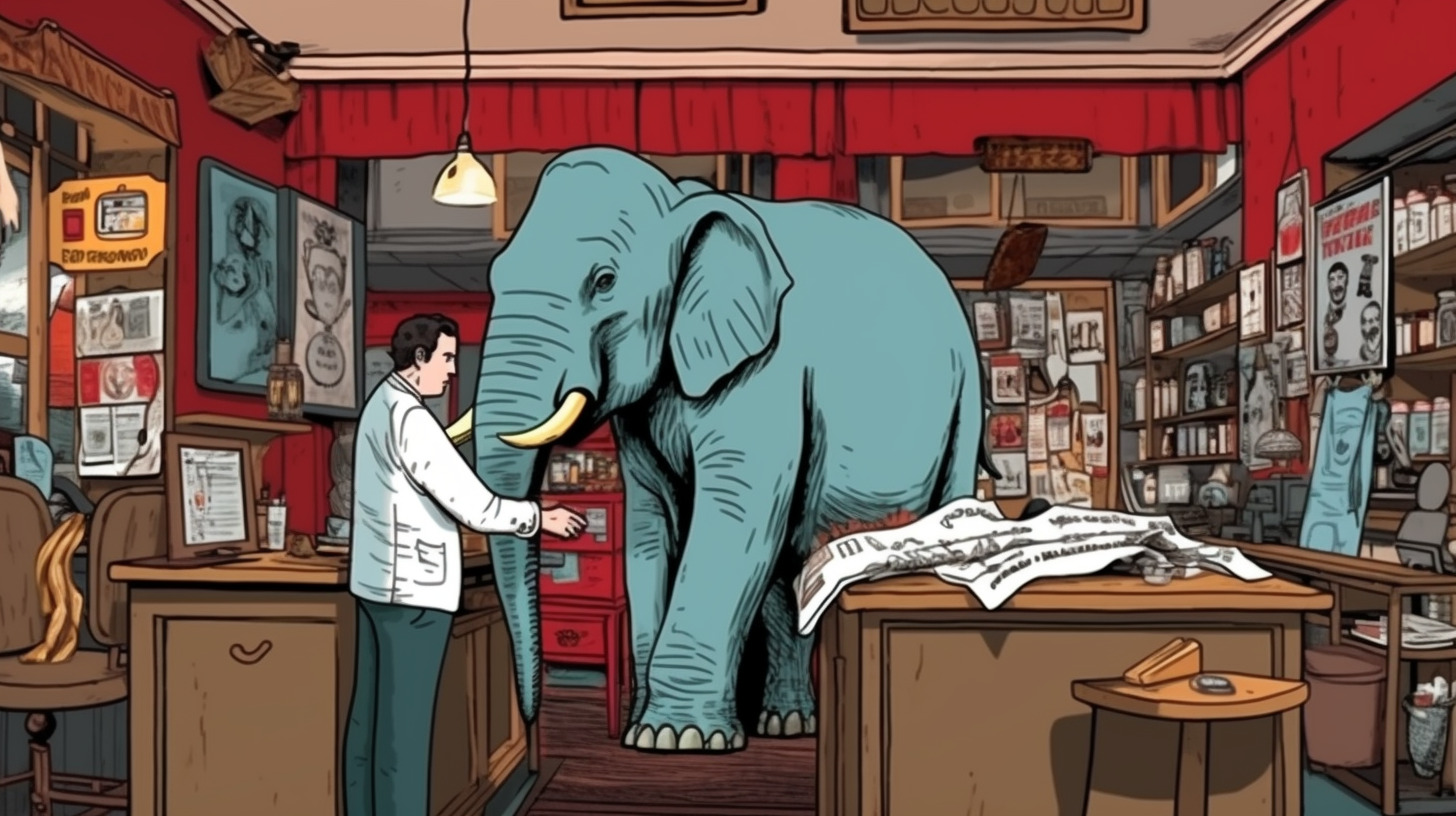धन की लालसा
परिचय: धन की लालसा किसे नहीं होती? जब लॉटरी के टिकट आए, तो विक्रम के परिवार ने भी टिकट खरीदे।
जल्दी से मालदार हो जाने की हवस किसे नहीं होती? उन दिनों जब लॉटरी के टिकट आये तो मेरे दोस्त विक्रम के पिता, चाचा, अम्मा और भाई सभी ने एक-एक टिकट खरीद लिया. कौन जाने, किसकी तकदीर जोर करे? किसी के नाम आये, रुपया रहेगा तो घर में ही!
“The Lottery” by Munshi Premchand is a compelling read that offers a deep insight into human nature and the complexities of the human heart. Its realistic portrayal of characters, emotional depth, and social critique make it a remarkable piece of literature.

Last updated March 10th, 2024
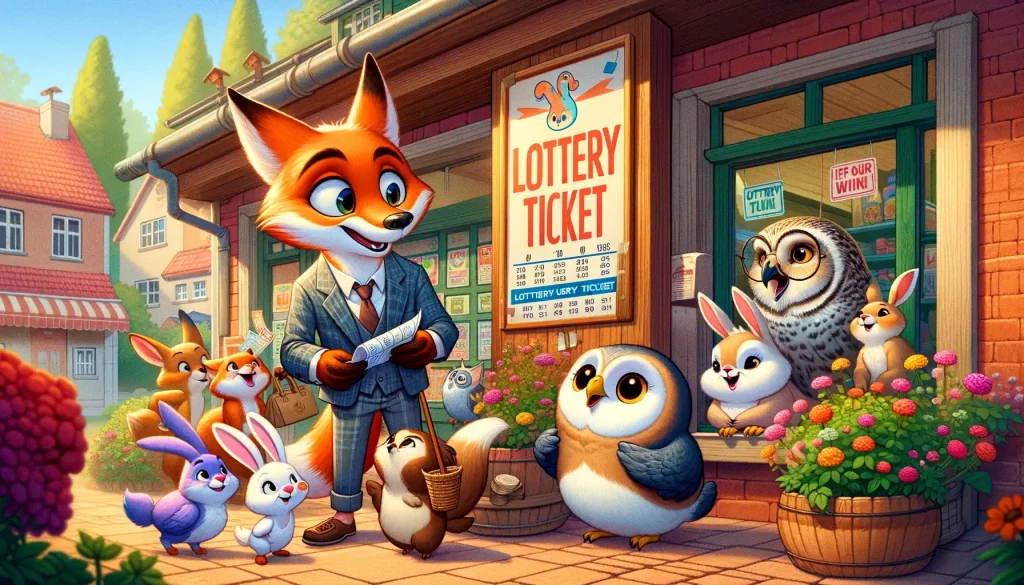
विक्रम की योजना
परिचय: विक्रम के पास बड़े-बड़े मंसूबे थे, जिनमें विश्व यात्रा और एक बड़े पुस्तकालय की स्थापना शामिल थी।
मगर विक्रम को सब न हुआ. औरों के नाम रुपये आएंगे, फिर उसे कौन पूछता है? बहुत होगा दस-पांच हजार उसे दे देंगे. इतने रुपयों में उसका क्या होगा? उसको जिन्दगी में बड़े-बड़े मंसूबे थे. पहले तो उसे सम्पूर्ण जगत की यात्रा करनी थी, एक-एक कोने की. पीरू, ब्राजील, टिम्बकटू और होनोलूलू. यह सब उसके प्रोग्राम में थे. वह आंधी की तरह महीने-दो महीने उड़कर लोट आनेवालों में न था. वह एक-एक स्थान में कई-कई दिन ठहरकर वहां के रहन-सहन, रीति-रिवाज आदि का अध्ययन करना और संसार यात्रा का एक वृहद् ग्रंथ लिखना चाहता था. फिर उसे एक बहुत बड़ा पुस्तकालय बनवाना था, जिसमें दुनिया भर की उत्तम रचनाएं जमा की जाएं. पुस्तकालय के लिए वह दो लाख तक खर्च करने को तैयार था. बंगला, कार और फर्नीचर तो मामूली बातें थीं. पिता या चचा के नाम रुपये आये, तो पांच हजार से ज्यादा का डौल नहीं, अम्मा के नाम आए, तो बीस हजार मिल जाएंगे; लेकिन भाई साहब के नाम आ गए, तो उसके हाथ धेला भी न लगेगा. वह आत्माभिमानी था. घरवालों से भो खैरात या पुरस्कार के रूप में कुछ लेने की बात उसे अपमान-सी लगती थी. कहा करता या- भाई, किसी के सामने हाथ फैलाने से तो किसी गड्ढे में डूब मरना अच्छा है. जब आदमी अपने लिए संसार में कोई स्थान न निकाल सके, तो यहां से प्रस्थान कर जाए.
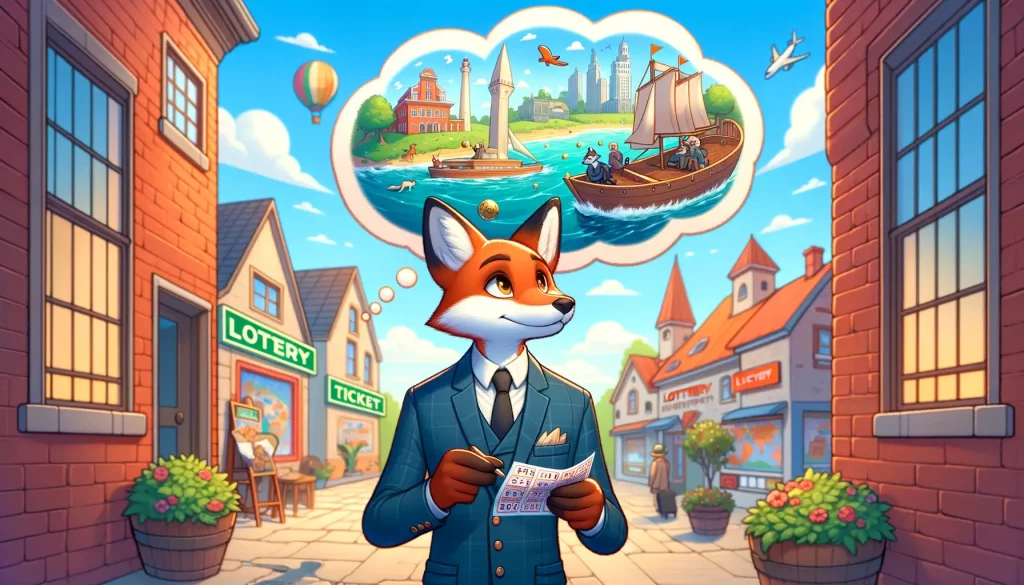
साझेदारी का प्रस्ताव
परिचय: विक्रम ने मुझे साझेदारी में टिकट खरीदने का प्रस्ताव दिया, जिसे मैंने स्वीकार किया।
वह बहुत बेकार था. घर में लॉटरी-टिकट के लिए उसे कौन रुपया देगा और वह मांगे भी तो कैसे. उसने बहुत सोच-विचारकर कहा- क्यों न हम-तुम साझे में टिकट ले लें.
टिकट की खरीदारी
परिचय: हमने पुरानी किताबें बेचकर टिकट खरीदा और अपने भाग्य का इंतजार करने लगे।
तजवीज मुझे भी पसन्द आयी. मै उन दिनों स्कूल-मास्टर था. बीस रुपये मिलते थे. उसमें बड़ी मुश्किल से गुजर होती थी. दस रुपये का टिकट खरीदना मेरे लिए हाथी खरीदना था. हां, एक महीना दूध, घी, जलपान और ऊपर के सारे खर्च तोड़कर पांच रुपये की गुंजाइश निकल सकती थी. फिर भी जी डरता था. कहीं से कोई बालाई रकम मिल जाय, तो कुछ हिम्मत बढ़े.
विक्रम ने कहा- ‘कहो तो अपनी अंगूठी बेच डालूं? कह दूंगा, उंगली से फिसल पड़ी.’
अंगूठी दस रुपये से कम न थी. उसमें पूरा टिकट आ सकता था, अगर कुछ खर्च किए बिना ही टिकट में आधा-साझा हुआ जाता है, तो क्या बुरा है.
सहसा विक्रम फिर बोला- ‘लेकिन भई, तुम्हें नकद देने पड़ेंगे. मैं पांच रुपये नकद लिए बगैर साझा न करूंगा.’
अब मुझे औचित्य का ध्यान आ गया. बोला- नहीं, यह बुरी बात है, चोरी खुल जाएगी, तो शर्मिन्दा होना पड़ेगा, और तुम्हारे साथ मुझ पर भी डांट पड़ेगी.
आखिर यह तय हुआ कि पुरानी किताबें किसी सेकण्ड हैड किताबों की दुकान पर बेच डाली जाएं और उस रुपये से टिकट लिया जाए. किताबों से ज्यादा बेजरूरत हमारे पास कोई चीज न थी. हम दोनों साथ ही मैट्रिक पास हुए थे और यह देखकर कि जिन्होंने डिग्रियां लीं, अपनीआंखें फोड़ीं और घर के रुपये बरबाद किए, वह भी जूतियां चटका रहे हैं. हमने वहीं हाल्ट कर दिया. मैं स्कूल मास्टर हो गया और विक्रम मटरगश्त करने लगा.
हमारी पुरानी पुस्तकें अब दीमकों के सिवा हमारे किसी काम की न थीं. हमसे जितना चाटते बना चाटा, उनका सत्त निकाल लिया. अब चूहे चाटें या दीमक, हमें परवाह न थी. आज हम दोनों ने उन्हें कूड़खाने से निकाला और झाड़-पोंछकर एक बड़ा-सा गट्ठर बांधा.
आशा और निराशा
परिचय: जैसे-जैसे लॉटरी का दिन नजदीक आया, हमारी आशा और निराशा के भाव बढ़ते गए।
मैं मास्टर था, किसी बुकसेलर की दूकान पर किताब बेचते हुए झेंपता था. मुझे सभी पहचानते थे. इसलिए यह खिदमत विक्रम के सुपुर्द हुई और वह आध घंटे में दस रुपये का एक नोट लिए उछलता-कूदता आ पहुंचा. मैंने उसे इतना प्रसन्न कभी न देखा था. किताबें चालीस रुपये से कम की न थीं, पर यह दस रुपये उस वक्त हमें जैसे पड़े हुए मिले. अब टिकट में आधा साझा होगा. दस लाख की रकम मिलेगीॉ. पांच लाख मेरे हिस्से में आएंगे, पांच विक्रम के. हम अपने इसी में मगन थे.
मैंने संतोष का भाव दिखाकर कहा- पांच लाख कुछ कम नहीं होते जी.
विक्रम इतना संतषी न था. बोला- पांच लाख क्या, हमारे लिए तो इस वक्त पांच सौ भी बहुत हैं भाई. मगर जिन्दगी का प्रोग्राम तो बदलना पड़ गया. मेरी यात्रावाली स्कीम तो टल नहीं सकती. हां, पुस्तकालय गायब हो गया.
मैंने आपत्ति की – ‘आखिर यात्रा में तुम दो लाख से ज्यादा तो न खर्च करोगे?’
‘जी नहीं, उसका बजट है साढ़े तीन लाख का. सात वर्ष का प्रोग्राम है. पचास हजार रुपये साल ही तो हुए?’
‘चार हजार महीना कहो. मैं समझता हूं, दो हजार में तुम बड़े आराम से रह सकते हो.’
विक्रम ने गर्म होकर कहा- ‘मैं शान से रहना चाहता हूं. भिखारियों की तरह नहीं.’
‘दो हजार में भी तुम शान से रह सकते हो.’
‘जब तक आप अपने हिस्से में से दो लाख मुझे न देंगे, पुस्तकालय न बन सकेगा.’
‘कोई जरूरी नहीं कि तुम्हारा पुस्तकालय शहर में बेजोड़ हो.’
‘मैं तो बेजोड़ ही बनवाऊंगा.’
9 best Tenali Raman moral story in Hindi for kids with moral
‘इसका तुम्हें अख्तियार है; लेकिन मेरे रुपयों में से तुम्हें कुछ न मिल सकेगा. मेरी ज़रूरतें देखो. तुम्हारे घर में काफी जायदाद है. तुम्हारे सिर कोई बोझ नहीं, मेरे सिर तो सारी गृहस्थी का बोझ है. दो बहनों का विवाह है, दो भाइयों की शिक्षा है, नया मकान बनवाना है. मैंने तो निश्चय कर लिया है कि सब रुपये सीधे बैंक में जमा कर दूंगा. उनके सूद से काम चलाऊंगा. कुछ ऐसी शर्तें लगा दूंगा कि मेरे बाद भी कोई इस रकम में हाथ न लगा सके.’
विक्रम ने सहानुभूति के भाव से कहा– हां, ऐसी दशा में तुमसे कुछ मांगना अन्याय है. खैर, मैं ही तकलीफ उठा लूंगा लेकिन बैंक के सूद की दर तो बहुत गिर गई है.
हमने कई बैंकों के सूद की दर देखी. स्थायी कोष की भी, सेविंग बैंक का भी. बेशक दर बहुत कम थी. दो-ढाई रुपये सैकड़े ब्याज पर जमा करना व्यर्थ है. क्यों न लेन-देन का कारोबार शुरू किया जाय? विक्रम भी यात्रा पर न जाएगा. दोनों के साझे में कोठी चलेगी, जब कुछ धन जमा हो जाएगा, तब वह यात्रा करेगा. लेन-देन में सूद भी अच्छा मिलेगा और अपना रोब-दाब भी रहेगा. हां, जब तक अच्छी जमानत न हो, किसी को रुपया न देना चाहिए, चाहे आसामी कितना ही मातबर क्यों न हो. और जमानत पर रुपये दे ही क्यों? जायदाद रेहन लिखाकर रुपये देंगे. फिर तो कोई खटका न रहेगा. यह मंजिल भी तय हुई.
अब यह प्रश्न उठा कि टिकट पर किसका नाम रहे. विक्रम ने अपना नाम रखने के लिए बड़ा आग्रह किया; अगर उसका नाम न रहा, तो वह टिकट ही न लेगा. मैंने कोई उपाय न देखकर मंजूर कर लिया और बिना किसी लिखा-पढ़ी के, जिससे आगे चलकर मुझे बड़ी परेशानी हुई.
एक-एक करके इन्तजार के दिन कटने लगे. भोर होते ही हमारी आंखें कैलेंडर पर जातीं. मेरा मकान विक्रम के मकान से मिला हुआ था. स्कूल जाने के पहले और स्कूल से आने के बाद हम दोनों साथ बैठकर अपने-अपने मंसूबे बांधा करते और इस तरह सांय-सांय कि कोई सुन न ले. हम अपने टिकट खरीदने का रहस्य छिपाये रखना चाहते थे. यह रहस्य जब सत्य का रूप धारण कर लेगा, उस वक्त लोगों को कितना विस्मय होगा! उस दृश्य का नाटकीय आनन्द हम नहीं छोड़ना चाहते थे.
एक दिन बातों-बातों में विवाह का जिक्र आ गया. विक्रम ने दार्शनिक गम्भीरता से कहा- भाई, शादी-वादी का जंजाल तो मैं नहीं पालना चाहता! व्यर्थ को चिन्ता और हाय-हाय. पत्नी की नाज़बरदारी में ही बहुत-से रुपये उड़ जाएंगे.
मैंने इसका विरोध किया- हां, यह तो ठीक है, लेकिन जब तक जीवन के सुख-दुःख का कोई साथी न हो, जीवन का आनन्द ही क्या? मै तो विवाहित जीवन से इतना विरक्त नहीं हूं. हां, साथी ऐसा चाहता हूं जो अन्त तक साथ रहे और ऐसा साथी पत्नी के सिवा दूसरा नहीं हो सकता.
विक्रम जरूरत से ज्यादा तुनुकमिजाजी से बोला- खैर, अपना-अपना दृष्टिकोण है. आपको बीवी मुबारक और कुत्तों की तरह उसके पीछे-पीछे चलना तथा बच्चों को संसार की सबसे बड़ी विभूति और ईश्वर की सबसे बड़ी दया समझना मुबारक. बंदा तो आजाद रहेगा, अपने मजे से जहां चाहा गए. जब चाहा उड़ गए और जब चाहा घर आ गये. यह नहीं कि हर वक्त एक चौकीदार आपके सिर पर सवार हो. जरा-सी देर हुई घर आने में और फौरन जवाब-तलब हुआ, कहां थे अब तक? आप कहीं बाहर निकले और फौरन सवाल हुआ, कहां जाते हो? और कहीं दुर्भाग्य से पत्नीजी भी साथ हो गईं, तब तो डूब मरने के सिवा आपके लिए कोई मार्ग ही नहीं रह जाता. ना भैया, मुझे आपसे जरा भी सहानुभूति नहीं. बच्चे को जरा-सा जुकाम हुआ और आप बेतहाशा दौड़े चले जा रहे हैं होमियोपैथिक डाक्टर के पास. जरा उम्र खिसकी और लौडे मनाने लगे कि अब आप प्रस्थान करें और वह गुलछर्रें उड़ाएं. मौका मिला तो आपको जहर खिला दिया और मशहूर किया कि आपको कॉलरा हो गया था. मैं इस जंजाल में नहीं पड़ता.
कुन्ती आ गयी. विक्रम की छोटी बहन थी, कोई ग्यारह साल की. छठे में पढ़ती थी और बराबर फेल होती थी. बड़ी चिबिल्ली, बड़ी शोख! इतने धमाके से द्वार खोले कि हम दोनों चौंककर उठ खड़े हुए.
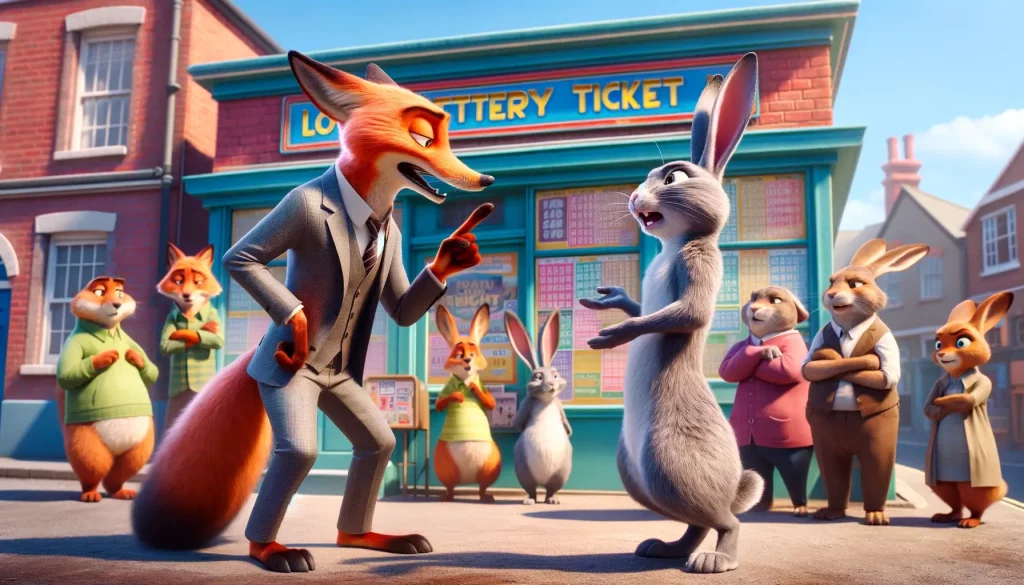
विक्रम ने बिगड़कर कहा–तू बड़ी शैतान है कुन्ती, किसने तुझे बुलाया यहां?
कुन्ती ने खुफिया पुलिस की तरह कमरे में नजर दौड़ाकर कहा- तुम लोग हरदम यहां किवाड़ बन्द किए बैठे क्या बातें किया करते हो. जब देखो, यहीं बैठे हो. न कहीं घूमने जाते हो, न तमाशा देखने, कोई जादू-मन्तर जगाते होंगे?
विक्रम ने उसकी गरदन पकड़कर हिलाते हुए कहा- हां, एक मंतर जगा रहे हैं, जिसमें तुझे एक दूल्हा मिले, जो रोज गिनकर पांच हण्टर जमाए सड़ासड़!
कुन्ती उसकी पीठ पर बैठकर बोली- मैं ऐसे दूल्हे से ब्याह करूंगी, जो मेरे सामने खड़ा पूंछ हिलाता रहेगा. मैं मिठाई के दोने फेंक दूंगी और वह चाटेगा. जरा भी ची-चपड़ करेगा, तो कान गर्म कर दूंगी. अम्मा के लॉटरी के रुपये मिलेंगे, तो पचास हजार मुझे दे देंगी. बस, चैन करूंगी. मैं दोनों वक्त ठाकुरजी से अम्मा के लिए प्रार्थना करती हूं, अम्मा कहती हैं, कुंवारी लड़कियों की दुआ कभी निष्फल नहीं होती. मेरा मन तो कहता है, अम्माँ को जरूर रुपये मिलेंगे.
मुझे याद आया, एक बार मैं अपने ननिहाल देहात में गया था, तो सूखा पड़ा हुआ था. भादों का महीना आ गया था; मगर पानी की बूंद नहीं. तब लोगों ने चन्दा करके गांव की सब कुंवारी लड़कियों की दावत की थी. और उसके तीसरे ही दिन मूसलाधार वर्षा हुई थी. अवश्य ही कुंवारियों की दुआ में असर होता है.
मैंने विक्रम को अर्थपूर्ण आंखों से देखा, विक्रम ने मुझे. आंखों ही में हमने सलाह कर ली और निश्चय भी कर लिया. विक्रम ने कुन्ती से कहा- अच्छा, तुझसे एक बात कहें, किसी से कहेगी तो नहीं? नहीं, तू तो बड़ी अच्छी लड़की है, किसी से न कहेगी. मैं अबकी तुझे खूब पढ़ाऊंगा और पास करा दूंगा. बात यह है कि हम दोनों ने भी लॉटरी का टिकट लिया है. हम लोगों के लिए भी ईश्वर से प्रार्थना किया कर; अगर हमें रुपये मिले, तो तेरे लिए अच्छे-अच्छे गहने बनवा देंगे. सच!
कुन्ती को विश्वास न आया. हमने कस्में खायीं. वह नखरे करने लगी. जब हमने उसे सिर से पांव तक सोने और हीरे से मढ़ देने की प्रतिज्ञा की, तब वह हमारे लिए दुआ करने पर राजी हुई.
लेकिन उसके पेट में मनों मिठाई पच सकती थी, यह जरा-सी बात न पची. सीधे अन्दर भागी और एक क्षण में सारे घर में यह खबर फैल गई. अब जिसे देखिए, विक्रम को डांट रहा है, अम्माँ भी, चचा भी, पिता भी, केवल विक्रम की शुभ कामना से या और किसी भाव से, कौन जाने बैठे-बैठे तुम्हें हिमाकत ही सूझती है. रुपये लेकर पानी में फेंक दिए. घर में इतने आदमियों ने तो टिकट लिया ही था, तुम्हें लेने की क्या जरूरत थी, क्या तुम्हें उसमें से कुछ न मिलते? और तुम भी मास्टर साहब, बिलकुल घोंघा हो. लड़के को अच्छी बातें क्या सिखाओगे और उसे चौपट किए डालते हो.
विक्रम तो लाडला बेटा था. उसे और क्या कहते. कहीं रूठकर एक-दो जून खाना न खाए, तो आफत ही आ जाए. मुझ पर सारा गुस्सा उतरा. इसकी सोहबत में लड़का बिगड़ा जाता है.
‘पर उपदेश कुशल बहुतेरे’ वाली कहावत मेरी आंखों के सामने थी. मुझे अपने बचपन की एक घटना याद आई. होली का दिन था. शराब की एक बोतल मंगवाई गई थी. मेरे मामू साहब उन दिनों आए हुए थे. मैंने चुपके से कोठरी में जाकर ग्लास में एक घूंट शराब डाली और पी गया. अभी गला जल ही रहा था और आंखें लाल ही थीं, कि मामू साहब कोठरी में आ गए और मुझे मानों सेंध में गिरफ्तार कर लिया और इतना बिगड़े-इतना बिगड़े कि मेरा कलेजा सूखकर छुहारा हो गया. अम्मा ने भी डांटा, पिताजी ने भी डांटा. मुझे आंसुओ से उनकी क्रोधाग्नि शान्त करनी पड़ी और दोपहर ही को मामू साहब नशे से पागल होकर गाने लगे फिर रोये, फिर अम्माँ को गालियां दीं. दादा को मना करने पर मारने दौड़े, और आखिर में कै करके जमीन पर बेसुध पड़े नजर आए.
विक्रम के पिता बड़े ठाकुर साहब और ताऊ छोटे ठाकुर साहब दोनों जड़वादी थे. पूजा-पाठ की हंसी उड़ानेवाले, पूरे नास्तिक; मगर अब दोनों बड़े निष्ठावान और ईश्वर-भक्त हो गए थे. बड़े ठाकुर साहब तो प्रातःकल गंगा-स्नान करने जाते और मन्दिरों के चक्कर लगाते हुए दोपहर को सारी देह में चन्दन लपेटे घर लौटते. छोटे ठाकुर साहब घर पर ही गर्म पानी से स्नान करते और गठिया से ग्रस्त होने पर भी राम-नाम लिखना शुरू कर देते. धूप निकल आने पर पार्क की ओर निकल जाते और चींटियों को आटा खिलाते. शाम होते ही दोनों भाई अपने ठाकुरद्वारे में जा बैठते और आधी रात तक भागवत् की कथा तन्मय होकर सुनते. विक्रम के बड़े भाई प्रकाश को साधु-महात्माओं पर अधिक विश्वास था. वह मठों और साधुत्रों के अखाड़ों और कुटियों की खाक छानते. माताजी को तो भोर से आधी रात तक स्नान, पूजा और व्रत के सिवा दूसरा काम ही न था. इस उम्र में भी उन्हें सिगार का शौक था; पर आजकल पूरी तपस्विनी बनी हुई थीं. लोग नाहक लालसा को बुरा कहते हैं. मैं तो समझता हूं, हममें जो यह भक्ति, निष्ठा और धर्म-प्रेम है, वह केवल हमारी लालसा, हमारी हवस के कारण. हमारा धर्म हमारे स्वार्थ के बल पर टिका हुआ है. हवस मनुष्य के मन और बुद्धि का इतना संस्कार कर सकती है, यह मेरे लिए बिलकुल नया अनुभव था. हम दोनों भी ज्योतिषियों और पंडितों से प्रश्न करके अपने को कभी दुःखी कर लिया करते थे.
ज्यों-ज्यों लॉटरी का दिन समीप आता जाता था, हमारे चित्त की शांति उड़ती जाती थी. हमेशा उसी ओर मन टंगा रहता. मुझे आप-ही-आप अकारण सन्देह होने लगा कि कहीं विक्रम मुझे हिस्सा देने से इनकार कर दे तो मैं क्या करूंगा. साफ इनकार कर जाय कि तुमने टिकट में साझा किया ही नहीं. न कोई तहरीर है, न कोई दूसरा सबूत. सब कुछ विक्रम की नीयत पर है. उसकी नीयत जरा भी डांवाडोल हुई और मेरा काम तमाम. कहीं फरियाद नहीं कर सकता, मुंह तक नहीं खोल सकता. अब अगर कुछ कहूं भी तो कोई लाभ नहीं. अगर उसकी नीयत में फितूर आ गया है, तब तो वह अभी से इनकार कर देगा; अगर नहीं आया है, तो इस सन्देह से उसे मर्मान्तक वेदना होगी. आदमी ऐसा तो नहीं है. मगर भई, दौलत पाकर ईमान सलामत रखना कठिन है! अभी तो रुपये नहीं मिले. इस वक्त ईमानदार बनने में क्या खर्च होता है. परीक्षा का समय तो तब आएगा, जब दस लाख रुपये हाथ में होंगे. मैंने अपने अन्तःकरण को टटोला-अगर टिकट मेरे नाम का होता और मुझे दस लाख मिल जाते, तो क्या मैं आधे रुपये बिना कान-पूंछ हिलाए विक्रम के हवाले कर देता? कौन कह सकता है; मगर अधिक सम्भव यही था कि मैं होले-हवाले करता, कहता- तुमने ‘मुझे पांच रुपये उधार दिए थे. उसके दस ले लो, सौ ले लो, और क्या करोगे; मगर नहीं, मुझसे इतनी बददियानत न होती.
दूसरे दिन हम दोनों अखबार देख रहे थे कि सहसा विक्रम ने कहा- कहीं हमारा टिकट निकल आए, तो मुझे अफसोस होगा कि नाहक तुमसे साझा किया!
वह सरल भाव से मुसकराया; मगर यह थी उसके आत्मा की झलक जिसे वह विनोद की आड़ में छिपाना चाहता था.
मैने चौंककर कहा- सच! लेकिन इसी तरह मुझे भी तो अफसोस हो सकता है?
‘लेकिन टिकट तो मेरे नाम का है?
‘इससे क्या.’
‘अच्छा, मान लो, मैं तुम्हारे साझे से इनकार कर जाऊं?’
मेरा खून सर्द हो गया. आंखों के सामने अंधेरा छा गया.
‘मैं तुम्हें इतना बदनीयत नहीं समझता था.’
‘मगर है बहुत संभव. पांच लाख! सोचो! दिमाग चकरा जाता है.
‘तो भई, अभी से कुशल है, लिखा-पढ़ी कर लो. यह संशय रहे ही क्यों?
‘विक्रम ने हंसकर कहा- तुम बड़े शक्की हो यार! मैं तुम्हारी परीक्षा ले रहा था. भला, ऐसा कहीं हो सकता है. पांच लाख क्या, पांच करोड़ भी हों, तब भी ईश्वर चाहेगा, तो नियत में खलल न आने दूंगा.
किन्तु मुझे उसके इन आश्वासनों पर मिलकुल विश्वास न आया. मन में एक संशय पैंठ गया.
मैने कहा- यह तो मैं जानता हूं कि तुम्हारी नीयत कभी विचलित नहीं हो सकती; लेकिन लिखा-पढ़ी कर लेने में क्या हरज है?
‘फिजूल है.’
‘फिजूल ही सही.
‘तो पक्के कागज पर लिखना पड़ेगा. दस लाख की कोर्ट-फीस ही साढ़े सात हजार हो जाएगी. किस भ्रम में हैं आप!’
मैने सोचा, बला से, सादी लिखा-पढ़ी के बल पर कोई कानूनी कार्रवाई न कर सकूंगा. पर इन्हें लज्जित करने का, इन्हें जलील करने का, इन्हें सबके सामने बेईमान सिद्ध करने का अवसर तो मेरे हाथ आएगा और दुनिया में बदनामी का भय न हो, तो आदमी न जाने क्या करे. अपमान का भय कानून के भय से किसी तरह कम क्रियाशील नहीं होता. बोला – ‘मुझे सादे कागज पर ही विश्वास आ जाएगा.’
विक्रम ने लापरवाही से कहा- ‘जिस कागज का कोई कानूनी महत्व नहीं, उसे लिखकर क्यों समय नष्ट करें?’
मुझे निश्चय हो गया, विक्रम की नीयत में अभी से फितूर आ गया. नहीं तो सादा कागज लिखने में क्या बाधा हो सकती है. बिगड़कर कहा- ‘तुम्हारी नीयत अभी से खराब हो गयी.’
उसने निर्लज्जता से कहा- ‘तो क्या तुम यह साबित करना चाहते हो, कि ऐसी दशा में तुम्हारी नीयत न बदलती?’
‘मेरी नियत इतनी कमजोर नहीं है.’
‘रहने भी दो. बड़े नियतवाले! अच्छे-अच्छों को देखा है!’
‘तुम्हें इसी वक्त लेख-बद्ध होना पड़ेगा. मुझे तुम्हारे ऊपर विश्वास नहीं रहा.’
“अगर तुम्हें मेरे ऊपर विश्वास नहीं है, तो मैं भी नहीं लिखता.’
‘तो क्या तुम समझते हो, तुम मेरे रुपये हजम कर जाओगे.’
‘किसके रुपये और कैसे रुपये?’
‘मैं कहे देता हूं विक्रम, हमारी दोस्ती का ही अन्त हो जायगा; बल्कि इससे कहीं भयंकर परिणाम होगा.’ हिंसा की एक ज्वाला-सी मेरे अन्दर दहक उठी.
सहसा दीवानखाने में झड़प की आवाज सुनकर मेरा ध्यान उधर चला गया. यहां दोनों ठाकुर बैठा करते थे. उनमें ऐसी मैत्री थी, जो आदर्श भाइयों में हो सकती है. राम और लक्ष्मण में भी इतनी ही रही होगी. झड़प को तो बात ही क्या, मैने उनमें कभी विवाद होते भी न सुना था. बड़े ठाकुर जो कह दें, वह छोटे ठाकुर के लिए कानून था और छोटे ठाकुर की इच्छा देखकर ही बड़े ठाकुर कोई बात कहते थे. हम दोनों को आश्चर्य हुआ. दीवानखाने के द्वार पर जाकर खड़े हो गए. दोनों भाई अपनी-अपनी कुरसियों से उठकर खड़े हो गये थे, एक-एक कदम आगे भी बढ़ पाए थे, आँखें लाल, मुख विकृत, त्योरियां चढ़ी हुई, मुट्टियां बंधी हुईं. मालूम होता था, बस हाथा-पाई हुई ही चाहती है.
छाटे ठाकुर ने हमें देखकर पीछे हटते हुए कहा- सम्मिलित परिवार में जो कुछ भी और कहीं से भी और किसी के नाम भी आए, वह सबका है, बराबर.
बड़े ठाकुर ने विक्रम को देखकर एक कदम ओर आगे बढ़ाया- ‘हरगिज नहीं; अगर मै कोई जुर्म करूं, तो मैं पकड़ा जाऊंगा, सम्मिलित परिवार नहीं. मुझे सजा मिलेगी, सम्मिलित परिवार को नहीं. यह वैयक्तिक प्रश्न है.’
‘इसका फैसला अदालत से होगा.’
‘शौक से अदालत जाइए; अगर मेरे लड़के मेरी बीवी, या मेरे नाम लॉटरी निकली तो आपका उससे कोई सम्बन्ध न होगा, उसी तरह जैसे आपके नाम लॉटरी निकले, तो मुझसे, मेरी बीवी से या मेरे लड़के से उससे कोई सम्बन्ध न होगा.’
‘अगर मैं जानता आपकी ऐसी नीयत है, तो मैं भी बीवी-बच्चों के नाम से टिकट ले सकता था.’
‘यह आपकी गलती है.’
‘इसीलिए कि मुझे विश्वास था, आप भाई हैं.’
‘यह जुआ है, आपको समझ लेना चाहिए. जुए की हार-जीत का खानदान पर कोई असर नहीं पड़ सकता; अगर आप कल को दस-पांच हजार रेस में हार आएं, तो खानदान उसका जिम्मेदार न होगा.’
‘मगर भाई का हक दबाकर आप सुखी नहीं रह सकते.’
‘आप न ब्रह्मा हैं, न ईश्वर, न कोई महात्मा.’
विक्रम की माता ने सुना कि दोनों भाइयों में ठनी हुई है और मल्लयुद्ध हुआ चाहता है, तो दौड़ी हुई बाहर आईं. दोनों को समझाने लगीं.
छोटे ठाकुर ने बिगड़कर कहा- ‘आप मुझे क्या समझाती हैं, उन्हें समझाइए, जो चार-चार टिकट लिए बैठे हुए हैं. मेरे पास क्या है, एक टिकट. उसका क्या भरोसा! मेरी अपेक्षा जिन्हें रुपये मिलने का चौगुना चांस है, उनकी नीयत बिगड़ जाए तो लज्जा और दुःख की बात है.’
ठकुराइन ने देवर को दिलासा देते हुए कहा- ‘अच्छा, मेरे रुपये में से आधे तुम्हारे.। अब तो खुश हो.’
बड़े ठाकुर ने बीवी की जबान पकड़ी- ‘क्यों आधे लेंगे? मै एक घेला भी न दूंगा. हम मुरौवत और सुहृदयता से काम लें, फिर भी इन्हें पांचवें हिस्से से ज्यादा किसी तरह न मिलेगा. आधे का दावा किस नियम से हो सकता है, न बौद्धिक, न धार्मिक, न नैतिक.’
छोटे ठाकुर ने खिसियाकर कहा- ‘सारी दुनिया का कानून आप ही तो जानते हैं!
‘जानते ही हैं, तीस साल तक वकालत नहीं की है?’
‘यह वकालत निकल जाएगी, जब सामने कलकत्ते का बैरिस्टर खड़ा कर दूंगा.’
‘बैरिस्टर की ऐसी-तैसी, चाहे वह कलकत्ते का हो या लन्दन का!’
‘मैं आधा लूंगा, उसी तरह जैसे घर की जायदाद में मेरा आधा है.’
इतने में विक्रम के बड़े भाई साहब सिर और हाथ में पट्टी बांधे, लंगड़ाते हुए, कपड़ों पर ताजे खून के दाग लगाए, प्रसन्न-मुख आकर एक आराम-कुरसी पर गिर पड़े. बड़े ठाकुर ने घबड़ाकर पूछा- यह तुम्हारी क्या हालत है जी! ऐं, यह चोट कैसे लगी? किसी से मार-पीट तो नहीं हो गयी?
प्रकाश ने कुरसी पर लेटकर एक बार कराहा, फिर मुसकराकर बोले- जी, कोई बात नहीं, ऐसी कुछ बहुत चोट नहीं लगी.
‘कैसे कहते हो चोट नहीं लगी? सारा हाथ और सिर सूज गया है. कपड़े खून से तर. यह मुआमला क्या है? कोई मोटर-दुर्घटना तो नहीं हो गई.’
‘बहुत मामूली चोट है साहब, दो-चार दिन में अच्छी हो जाएगी. घबराने की कोई बात नहीं.’
प्रकाश के मुख पर आशापूर्ण, शान्त मुस्कान थी. क्रोध, लज्जा या प्रतिशोध की भावना का नाम भी न था.
बड़े ठाकुर ने और व्यग्र होकर पूछा- ‘लेकिन हुआ क्या, यह क्यों नहीं बतलाते? किसी से मार-पीट हुई हो, तो थाने में रपट करवा दूं.’
प्रकाश ने हलके मन से कहा, ‘मार-पीट किसी से नहीं हुई साहब! बात यह है कि मैं जरा झक्कड़ बाबा के पास चला गया था. आप तो जानते हैं, वह आदमियों की सूरत से भागते हैं और पत्थर लेकर मारने दौड़ते हैं. जो डरकर भागा, वह गया. जो पत्थर की चोटें खाकर भी उनके पीछे लगा रहा, वह पारस हो गया. वह यही परीक्षा लेते हैं. आज मैं वहां पहुंचा, तो कोई पचास आदमी जमा थे. कोई मिठाई लिए, कोई बहुमूल्य भेंट लिए. कोई कपड़ों के थान लिए. झक्कड़ बाबा ध्यानावस्था में बैठे हुए थे. एकाएक उन्होंने आंखें खोली और यह जन-समूह देखा, तो कई पत्थर चुनकर उनके पीछे दौड़े. फिर क्या था, भगदड़ मच गई. लोग गिरते-पड़ते भागे. हुर्र हो गए. एक भी न टिका. अकेला मै घंटाघर की तरह वहीं डटा रहा. बस उन्होंने पत्थर चला ही तो दिया. पहला निशाना सिर में लगा. उनका निशाना अचूक पड़ता है. खोपड़ी भन्ना गई. खून की धारा बह चली. लेकिन मैं हिला नहीं. फिर बाबाजी ने दूसरा पत्थर फेंका. वह हाथ में लगा. मैं गिर पड़ा और बेहोश हो गया. जब होश आया, तो वहां सन्नाटा था. बाबाजी भी गायब हो गए थे. अन्तर्ध्यान हो जाया करते हैं. किसे पुकारू, किससे सवारी लाने को कहूं. मारे दर्द के हाथ फटा पड़ता था और सिर से अभी तक खून जारी था. किसी तरह उठा और सीधा डाक्टर के पास गया. उन्होंने देखकर कहा- हड्डी टूट गई है. और पट्टी बांध दी. गर्म पानी से सेंकने को कहा है. शाम को फिर आवेंगे. मगर चोट लगी तो लगी; अब लॉटरी मेरे नाम आयी धरी है. यह निश्चय है. ऐसा कभी हुआ ही नहीं कि झक्कड़ बाबा की मार खाकर कोई नामुराद रह गया हो. मैं तो सबसे पहले बाबा की कुटी बनवा दूंगा.
बड़े ठाकुर साहब के मुख पर संतोष की झलक दिखाई दी. फौरन पलंग बिछ गया. प्रकाश उस पर लेटे. ठकुराइन पंखा झलने लगी, उनका मुख भी प्रसन्न था. इतनी चोट खाकर दस लाख पा जाना कोई बुरा सौदा न था.
छोटे ठाकुर साहब के पेट में चूहे दौड़ रहे थे. ज्यों ही बड़े ठाकुर भोजन करने गए और ठकुराइन भी प्रकाश के लिए भोजन का प्रबंध करने गईं, त्योंही छोटे ठाकुर ने प्रकाश से पूछा- क्या बहुत जोर से पत्थर मारते हैं?
जोर से तो क्या मारते होंगे?
प्रकाश ने उनका आशय समझकर कहा- अरे साहब, पत्थर नहीं मारते, बमगोले मारते हैं. देव-सा तो डील-डौल है, और बलवान इतने हैं कि एक घूंसे में शेरों का काम तमाम कर देते हैं. कोई ऐसा वैसा आदमी हो, तो एक हो पत्थर में टें हो जाए. कितने ही तो मर गए; मगर आज तक झक्कड़ बाबा पर मुकदमा नहीं चला. और दो-चार पत्थर मारकर ही नहीं जाते, जब तक आप गिर न पड़ें और बेहोश न हो जाएं, वह मारते जाएंगे; मगर रहस्य यही है कि आप जितनी ज्यादा चोटें खाएंगे, उतने ही अपने उद्देश्य के निकट पहुंचेंगे.
प्रकाश ने ऐसा रोएं खड़े कर देनेवाला चित्र खींचा कि छोटे ठाकुर साहब थर्रा उठे. पत्थर खाने की हिम्मत न पड़ी.
लॉटरी का परिणाम
परिचय: लॉटरी के दिन, विक्रम ने मजाक में कहा कि लॉटरी एक अमेरिकी हब्शी के नाम आई है, जिससे सभी निराश हो गए।

आखिर भाग्य के निपटारे का दिन आया- जुलाई की बीसवीं तारीख. कत्ल को रात! हम प्रातःकाल उठे, तो जैसे एक नशा चढ़ा हुआ था, आशा और भय के द्वन्द्व का. दोनों ठाकुरों ने घड़ी रात रहे गंगा-स्नान किया था और मन्दिर में बैठे पूजन कर रहे थे. आज मेरे मन में श्रद्धा जागी. मंदिर में जाकर मन-ही-मन ठाकुरजी की स्तुति करने लगा- अनाथों के नाथ, तुम्हारी कृपा-दृष्टि क्या हमारे ऊपर न होगी? तुम्हें क्या मालूम नहीं, हमने कितनी मुश्किल से टिकट खरीदे हैं. तुम तो अन्तर्यामी हो. संसार में हमसे ज्यादा तुम्हारी दया कौन डिजर्व करता है?
विक्रम सूट-बूट पहने मन्दिर के द्वार पर आया, मुझे इशारे से बुलाकर इतना कहा- मैं डाकखाने जाता हूं, और हवा हो गया. जरा देर में प्रकाश मिठाई के थाल लिए हुए घर में से निकले और मंदिर के द्वार पर खड़े होकर कंगालों को बांटने लगे, जिनकी एक भीड़ जमा हो गयी थी. और दोनों ठाकुर भगवान के चरणों में लौ लगाये बैठे हुए थे, सिर झुकाये, आंखें बन्द, अनुराग में डूबे हुए. बड़े ठाकुर ने सिर उठाकर पुजारी की ओर देखा और बोले- ‘भगवान तो बड़े भक्त-वत्सल हैं, क्यों पुजारीजी?’
पुजारी ने समर्थन किया- हां सरकार, भक्तों की रक्षा के लिए तो भगवान क्षीरसागर से दौड़े और गज को ग्राह के मुंह से बचाया.
एक क्षण के बाद छोटे ठाकुर साहब ने सिर उठाया और पुजारीजी से बोले- ‘क्यों पुजारीजी, भगवान् तो सर्वशक्तिमान हैं, अन्तर्यामी, सब के दिल का हाल जानते हैं?’
पुजारी ने समर्थन किया- ‘हां सरकार, अन्तर्यामी न होते, तो सबके मन की बात कैसे जान जाते? शवरी का प्रेम देखकर स्वयं उसकी मनोकामना पूरी की.’
पूजन समाप्त हुआ. आरती हुई. दोनों भाइयों ने आज ऊंचे स्वर से आरती गायी और बड़े ठाकुर ने दो रुपये थाल में डाले. छोटे ठाकुर ने चार रुपये डाले. बड़े ठाकुर ने एक बार कोप-दृष्टि से देखा और मुंह फेर लिया.
सहसा बड़े ठाकुर ने पुजारी से पूछा- ‘तुम्हारा मन क्या कहता है पुजारीजी!’
पुजारी बोला- ‘सरकार की फते है.’
छोटे ठाकुर ने पूछा- और मेरी?
पुजारी ने उसी मुस्तैदी से कहा-आपकी भी फते है!
बड़े ठाकुर श्रद्धा से डूबे भजन गाते हुए मंदिर से निकले- ‘प्रभुजी, मैं तो आयो सरन तिहारे, हां प्रभुजी.’
एक मिनट में छोटे ठाकुर साहब मंदिर से गाते हुए निकले- ‘अब पति राखो मोरे दयानिधि तोरी गति लखि न परे.’
मैं भी पीछे निकला और जाकर मिठाई बांटने में प्रकाश बाबू की मदद करना चाहा; पर उन्होंने थाल हटाकर कहा- आप रहने दीजिए, मैं अभी बांटे डालता हूं. अब रह ही कितनी गई है.
मैं खिसियाकर डाकखाने की तरफ चला कि विक्रम मुसकराता हुआ साइकिल पर आ पहुंचा. उसे देखते ही सभी जैसे पागल हो गए. दोनों ठाकुर सामने ही खड़े थे. दोनों बाज की तरह झपटे. प्रकाश के थाल में थोड़ी-सी मिठाई बच रही थी. उसने थाल जमीन पर पटकी और दौड़ा. और मैंने तो उस उन्माद में विक्रम को गोद में उठा लिया; मगर कोई उससे कुछ पूछता नहीं, सभी जय जयकार की हांक लगा रहे हैं.
बड़े ठाकुर ने आकाश की ओर देखा- बोलो राजारामचन्द्र की जय!
छोटे ठाकुर ने छलांग मारी- बोलो हनुमानजी की जय!
प्रकाश तालियां बजाता हुआ चीखा- दुहाई झक्कड़ बाबा की!
विक्रम ने और जोर से कहकहा मारा- फिर अलग खड़ा होकर बोला -जिसका नाम आया है, उससे एक लाख लूंगा. बोलो है मंजूर?
बड़े ठाकुर ने उसका हाथ पकड़ा-पहले बता तो!
‘ना! यों नहीं बताता.
छोटे ठाकुर बिगड़े- महज बताने के लिए एक लाख? शाबाश!
प्रकाश ने भी त्योरी चढ़ाईं- क्या डाकखाना हमने देखा नहीं है?
‘अच्छा तो अपना-अपना नाम सुनने के लिए तैयार हो जाओ.’
सभी फौजी अटेंशन की दशा में निश्चल खड़े हो गए.
‘होश-हवाश ठीक रखना.’
सभी पूर्ण सचेत हो गए.
‘अच्छा तो सुनिए कान खोलकर, इस शहर का सफाया है. इस शहर का ही नहीं, सम्पूर्ण भारत का सफाया है. अमेरिका के एक हब्शी का नाम आ गया.’
परिणाम का स्वीकार
परिचय: अंत में, हमें स्वीकार करना पड़ा कि लॉटरी में जीतना केवल भाग्य का खेल है, और हमें अपनी मेहनत पर भरोसा करना चाहिए।
बड़े ठाकुर झल्लाये- ‘झूठ, झूठ, बिलकुल झूठ!’
छोटे ठाकुर ने पैंतरा बदला- कभी नहीं. तीन महीने की तपस्या यों हो रही! वाह!
प्रकाश ने छाती ठोककर कहा- ‘यहां सिर फुड़वाये और हाथ तुड़वाये बैठे हैं; दिल्लगी है!’
इतने में और पचासों आदमी इधर से रोनी सूरत लिए निकले. ये बेचारे भी डाकखाने से अपनी किस्मत को रोते चले आ रहे थे. मार ले गया अमेरिका का हब्शी! अभागा! पिशाच! दुष्ट!
अब कैसे किसी को विश्वास न आता. बड़े ठाकुर झल्लाये हुए मन्दिर में गए और पुजारी को डिसमिस कर दिया- ‘इसीलिए तुम्हें इतने दिनों से पाल रखा है! हराम का माल खाते हो और चैन करते हो.’
छोटे ठाकुर साहब की तो जैसे कमर टूट गई. दो-तीन बार सिर पीटा और वहीं बैठ गए; मगर प्रकाश के क्रोध का पारावार न था. उसने अपना मोटा सोटा लिया और झक्कड़ बाबा की मरम्मत करने चला.
माताजी ने केवल इतना कहा- ‘सभी ने बेईमानी की है. मैं कभी मानने की नहीं. हमारे देवता क्या करें! किसी के हाथ से थोड़े ही छीन लाएंगे.’
रात को किसी ने खाना नहीं खाया. मैं भी उदास बैठा हुआ था कि विक्रम आकर बोला- चलो होटल से कुछ खा आएं. घर में तो चूल्हा नहीं जला.
मैने पूछा- ‘तुम डाकखाने से आए, तो बहुत प्रसन्न क्यों थे?’
उसने कहा- ‘जब मैंने डाकखाने के सामने हजारों की भीड़ देखी, तो मुझे अपने लोगों के गधेपन पर हंसी आयी. एक शहर में जब इतने आदमी हैं, तो सारे हिन्दस्तान में इसके हजार गुने से कम न होंगे और दुनिया में तो लाख गुने से भी ज्यादा हो जाएंगे. और मैंने आशा का जो एक पर्वत-सा खड़ा कर रखा था, वह जैसे एकबारगी इतना छोटा हुआ कि राई बन गया, और मुझे हंसी आई. जैसे कोई दानी पुरुष छटांक भर अन्न हाथ में लेकर एक लाख आदमियों को नेवता दे बैठे और यहां हमारे घर का एक-एक आदमी समझ रहा है कि……मैं भी हंसा-हां, बात तो यथार्थ में यही है, और हम दोनों लिखा-पढ़ी के लिए लड़े मरते थे; मगर सच बताना, तुम्हारी नीयत खराब हुई थी की नहीं?
विक्रम मुसकराकर बोला- ‘अब क्या करोगे पूछकर. पर्दा ढंका रहने दो.’
Munshi Premchand story lottery(English Version No Ads)
Who isn’t hungry to get rich quickly? Those days when the lottery became prevalent, my friend Vikram’s father, uncle, mother and brother purchased a ticket each. Who knows whose luck would shine! Whosoever won, the prize money would remain within the family.
But Vikram was not happy. The money would come in someone else’s name. No one would care for him. At most he would get five-ten thousand. This amount was too small for him who had envisioned grand plans for himself. First of all, he intended to travel the whole world, its each and every corner. Peru, Brazil, Timbuktu and Honolulu – all these were in his itinerary. He was not one who would rush through the world like a whirlwind in one or two months. He would stay at each place for days, study its manners, its traditions, for he wanted to write an encyclopedic account of his world travels. And then, he had to build a huge library in which he would stack the world’s best books. He was ready to spend up to two lakh rupees; compared to which a bungalow and car and furniture would be commonplace acquisitions. If the money came to his father or uncle he would get at most five-ten thousand, twenty if it came to his mother, but not a half paisa, if it came to his brother. He was a self-respecting person. He thought it demeaning to accept any gift or benefit even from any member of his family. He used to say, ‘It’s better to drown oneself in a pond than to beg from anyone. If one cannot make a place for oneself in this world then it is better to quit the world.’
He was very restless. Who in the family would give him money to buy a lottery ticket? And why should he ask? After much reflection he said to me, ‘Why shouldn’t we jointly buy a ticket?’
I liked the proposal. Those days I was a school teacher, with a salary of twenty rupees. It was hard to make both ends meet. Buying a ten-rupee ticket was for me like buying a white elephant. Yes, it might be possible to save five rupees by cutting down on milk, ghee and sundry expenses. Even then I was not sure. It would be much better if I could get this amount from some other source.
Vikram said, ‘I don’t mind selling my ring. I’ll tell them that it slipped off my finger.’
The ring was certainly worth ten rupees. A ticket could be bought for both of us in this way. So where was the harm if I could become a fifty-fifty partner without spending anything?
But Vikram said, ‘Brother, you’ll have to pay in cash. I won’t make you a partner without your paying five rupees.’
Now I realized the impropriety of the proposal. I said, ‘No, bhai, this is wrong. If your lie is caught, we’ll both be shamed. And I too would be taken to task.’
Finally, it was decided that we’ll sell our old books to a second-hand book-dealer and buy the ticket with the money we get. We had nothing else that was less unwanted than the books. We two had passed the matriculation examination in the same year, and seeing that those who had obtained degrees by ruining their eyes and wasting money were now wearing out their shoes, we had decided to put the full stop. I became a school teacher and Vikram an idler. Our old books were now only food for white ants. We had licked off whatever we could, had extracted their essence, and now we didn’t care whether rats or white ants ate them up. We took them out of the garbage heap, dusted them and tied them in a bundle. Being a school teacher I felt ill at ease going to a book-seller to sell books. All of them knew me; so this task was given to Vikram, who returned with a ten-rupee note in half an hour. I had never seen him so full of joy. The books were worth no less than forty rupees but we felt as if we had picked the ten-rupee note from the ground. Now the ticket would be shared half-half. The prize would be worth ten lakhs. Out of which both of us would get five lakhs each.
I expressed my satisfaction, ‘Five lakhs is no small amount.’
But Vikram wasn’t as contented. He said, ‘Brother, not to speak of five lakhs, at the moment even five hundred are more than enough. But I am forced to change my plans. I can’t postpone my travel plans, but the library will have to go.’
I objected, ‘After all, you won’t need more than two lakhs for your travels.’
‘No sir. That’s budgeted for three and a half lakhs. It’s a seven-year project. So it works out to only fifty thousand a year.’
‘That is four thousand rupees per month. I think you can live comfortably with two thousand a month.’
Vikram retorted, ‘I want to live in style, not like a beggar.’
‘You can live in style even in two thousand.’
‘Unless you let me have two lakhs out of your share, I won’t be able to set up a library.’
‘There’s no reason why your library should be the best in the city.’
‘But I shall build only the best.’
‘That’s for you to decide, but I won’t give you anything out of my share. Your family has a lot of property. There’s no burden on you. But I have a big family to support. Two sisters to be married, two brothers to be educated. And I have to build a new house. I have decided that I shall put all the money in the bank and live on the interest. And I shall ensure that no one after me touches that money.’
Vikram responded sympathetically, ‘Yes, in that case it would be wrong to ask you for help. Never mind, I shall face the problem all by myself. But the interest rates at the banks have fallen quite a lot.’
We checked the interest rates at many banks, both for fixed deposits and savings accounts. Yes indeed the interest rates had fallen. It would be a waste of money to invest it at two or two and a half percent. Why not start the money-lending business? Vikram would not go on his world tour immediately. Both of them would run the business jointly and he would go on his tour when they have earned some money. They would be able to earn a good interest by lending money and in this way they would become quite influential too. They would not lend money on a bond unless a person was trustworthy. But why should they lend money on a bond? They would do it only on a property mortgage. In that case there would be no risk.
This issue was settled. Now we had to decide in whose name to buy the ticket. Vikram insisted on having his name on the ticket, saying he won’t buy the ticket unless his name was on the ticket. Finding no way out, I accepted, without any written agreement; as a result I was put to a lot of trouble later on.
2
We waited eagerly for each day to pass. Every morning the moment we woke up our eyes went for the calendar. My house was adjacent to Vikram’s. Before and after my school hours we would sit together and chalk out our plans in such quietness that no one could hear us. We wanted to keep the purchase of our ticket secret from all. Everyone would be wonder-struck when this secret plan of ours would become real. We didn’t want to miss the joy of that dramatic moment.
One day we came to discuss the issue of marriage. Vikram said, with philosophic seriousness, ‘I don’t wish to get into this trap of married life. Needless worries, and hues and cries. A lot of money would be wasted pleasing a wife.’
I disagreed, ‘You may be right, but life isn’t enjoyable unless you have someone to share your good and bad times. I’m not so apathetic to the idea of a married life. But yes, I would like a companion who stays with me for the life time. And only a wife can provide such companionship.’
Vikram retorted with unusual sarcasm, ‘Well, we all have our own views. You’re welcome to your married life, to follow your wife like a dog, to regard children as the greatest possession and gift from God. I shall remain a free man, sojourn whenever and wherever I like and return home at will. It won’t be as if you were under watch all the time. If you were even slightly late, you would be confronted with ‘where-were-you’. The moment you stepped out you would be immediately asked ‘whereto’, and if through misfortune your wife decided to accompany you, it would be the death of you. No brother, I won’t be able to sympathize with you. The child catches a cold and you dash to the homoeopath. You slide a bit into ripe age, and the boys wish for your quick exit so they can go on the spree. If they got a chance they would poison you and spread the news that you died of cholera. I won’t fall into this trap.’
Vikram’s younger sister, Kunti, about eleven, studying in class six and often failing to get through, talkative and mischievous, suddenly pushed the door open with such force that we both stood up startled.
Vikram shouted angrily at her, ‘You’re such a nuisance, Kunti! Who has called you here?’
Kunti ran her gaze all around the room like a spy and said, ‘What’re you doing here with doors shut? We see you sitting here all the time. You neither go out for a walk, nor to watch a show. Are you doing some black magic?’
Vikram caught and shook her by the neck and said, ‘Yes, we are casting a spell, so that you get a husband who would give you five whiplashes one after the other everyday.’
Kunti rode on his back and said, ‘I shall marry a man who will wag his tail in front of me. I shall cast the leaf-plate before him after eating sweets and tell him to lick it clean. And if he frets and fumes I shall pull and hot up his ears. If Amma wins the lottery she will give me fifty thousand, and I shall be content. I pray to God morning and evening. She says that prayers offered by virgins never go unanswered. My heart tells me that Amma will surely get the money.’
I remembered something. I had gone to my maternal grandparents’ village during a drought. It was the month of bhadon, the rainy month, and yet not a drop of rain. The villagers raised a pool of money and gave a feast to all the virgins of the village, and lo, the rains came pouring down heavily on the third day. Undoubtedly prayers by virgins do work miracles.
I and Vikram looked at each other meaningfully. And we came to a conclusion at once without exchanging a word. Vikram said to Kunti, ‘All right, if we tell you something, would you keep it secret? I’m sure you are such a good girl, you would keep our secret. This time I shall help you in your studies and make you get through the exams. The fact is we two have also purchased a lottery ticket. You should pray for us also and if we win we shall buy a lot of jewllery for you. Right!’
Kunti didn’t believe it. We swore. She became too demanding. Only when we promised to cover her in gold from head to foot, did she agree to pray for us.
However, she who could digest tons of sweets could not digest this small thing. She ran into the house and in no time the secret was out. Now everyone began to rail at Vikram – his mother, his uncle, his father – for his recklessness, whether out of concern for Vikram or with some other motive, one cannot fathom. ‘You have spilled money like water. Why did you have to buy one when so many others had bought lottery tickets? Wouldn’t you have got a share? And you, master sahib, are an utter fool. Instead of teaching something good you are leading him to his ruin.’
Vikram was their favourite son. They couldn’t berate him too much. If he was piqued and did not eat for a day or so, there would be trouble. It was I who drew the ire of the family, and the charge of misguiding the boy.
But the well-known saying: ‘People love to preach…’ came to my mind. I remembered a childhood incident. It was the day of Holi. My mamu, maternal uncle, was on a visit with us then. A bottle of liquor had been arranged. I went quietly into the backroom and poured some liquor in a glass and drank it off. My throat was still stinging and eyes were red when I was, as if, ambushed and caught red-handed by mamu. He gave me such a dressing-down that my heart shrivelled like a desiccated date. My mother upbraided me, my father upbraided me, and I had to quench the fire of their ire with tears. And soon, after noon mamu got drunk and began to sing. Then he wept, and then cursed my mother, and when my father tried to stop him he tried to rough him up. In the end he vomited and fell down unconscious.
3
Vikram’s father, the elder Thakur sahib, and his uncle, the younger Thakur sahib – both were materialists, full-blooded atheists who used to ridicule religious rituals. But these days they had become staunch believers and devotees of God. The elder Thakur sahib went for a dip in the Ganges every morning, visited all the temples and returned home in the afternoon, his body daubed with sandalwood paste. The younger Thakur sahib would bathe in warm water at home, and, even though suffering from gout, start writing and repeating, on and on, god Rama’s name. And as soon there was sunshine he would go out into the park to feed wheat flour to ants. And in the evening both the brothers would go to their temple and listen with rapt attention to the Bhagwat till midnight. Vikram’s elder brother had great faith in sadhus and mahatmas. He wandered through mathas, akharas and kutias of sadhus; and his mother had nothing else to do from morning till midnight except bathe, pray and fast. Even at this age she loved making herself up, but these days she acted like an ascetic. People are wrong when they denigrate desire. I believe that all the devotion and faith, and love of dharma we display is just a manifestation of our desire and lust. Our selfishness is at the root of our dharma. That greed can seep into our intellect and heart so much was something new to me. We too felt elated or sad after consulting astrologers or pandits.
As they day for the draw of the lottery was approaching, our peace of mind was evaporating. Our minds were riveted only on one thing. And for no reason I began to wonder what I would do if Vikram refused to part with my share. Make an about-turn and say I had never been a partner. There was no written agreement, nor any proof. If Vikram reneged it would be the end of me. I won’t be able to appeal to anyone, or open my mouth. If I said something now it would be no use. If his head has already turned he would straight away go back on the deal; and if he hasn’t he would be deeply hurt by my suspicious behaviour. He is not the type but it is difficult to remain honest after acquiring wealth. At the moment there is no money. So it is easy to pretend to be honest. The real test would come when he has ten lakh rupees in his hands. Then I searched my own conscience: if instead of Vikram the ticket had been in my name, would I have handed over his share of the money without dithering. Who knows? But the greater possibility was that I would have made excuses – that he had loaned me those five rupees, and offered him ten or a hundred rupees. But no, I won’t have acted so dishonestly.
The next day we were browsing through the newspaper when Vikram suddenly said, ‘If our ticket wins the prize, I would regret that I ever agreed to share it with you.’
He smiled innocently but this gave me a peep into his innermost feelings which he was trying to camouflage under this playfulness.
Startled I replied, ‘Really! But I too might be regretting.’
‘But the ticket is with me.’
‘So what!’
‘All right, suppose I refuse to share the money with you.’
My blood froze and darkness invaded my eyes.
‘I don’t think you are so dishonest.’
‘But it’s possible. Five lakhs. Think of it. It boggles your mind.’
‘Then, as all’s well now. Let’s sign a contract and remove all doubts.’
Vikram said laughingly, ‘You’re very distrustful, friend. I was only testing you. Is it ever possible? Even if it were five crores I would never go back on what is agreed.’
But I was not convinced.
I said, ‘I know that you can never break your word. Yet what’s wrong in making a written agreement?’
‘It’s a waste.’
‘Let it be.’
‘In that case it shall have to be on a court paper. The court fees on ten lakhs would come to seven and a half thousand. Have you thought of this?’
I reflected: It was true I won’t be able to proceed against him on the basis of a plain paper agreement, yet I would get the opportunity to humiliate him and characterize him as dishonest publicly. And people would go to any length, were it not for the fear of public disgrace. The fear of ignominy was no less effective than the fear of the law. So I said, ‘Agreement on a plain paper would assure me.’
Vikram retorted, ‘Why waste time in signing an agreement that would have no legal value?’
I was convinced now that Vikram had already decided to renege on the deal. Otherwise why should he have objected to signing the agreement on a plain paper? I said angrily, ‘You already have a bad conscience.’
He retorted shamelessly, ‘Do you want to prove that in such a situation you wouldn’t have broken the deal?’
‘I don’t have such a bad conscience.’
‘Drop it. Your good conscience! I know many like you.’
‘You’ll have to commit it to writing just now. I have lost faith in you.’
‘If that is so, I won’t commit to writing.’
‘So you think you can swallow up my share of money?
‘Whose money? And what money?’
‘I warn you, Vikram. This won’t only be the end of our friendship, but something worse would happen.’
A surge of violence arose in my heart.
Suddenly my attention was diverted by a fracas from the divankhana. Both the Thakurs used to relax there. Their affection for each other was a model of brotherly love, almost like that between Ram and Lakshman. I had never heard them argue, much less quarrel. The word of the elder Thakur was the law for the younger Thakur, but the elder Thakur never said anything that was not to the liking of the younger one. We were surprised and went and stood at the door of the sitting room. Both the brothers were up from their chairs, had even advanced towards each other, their eyes red, faces distorted, brows contracted. It seemed they were about to raise their hands against each other.
The younger Thakur drew back as he saw us and said, ‘Whatever is there in a joint family, wherever it may come from and in whosoever’s name, has to be shared equally by all.’
The elder Thakur, as soon as he saw Vikram, advanced and said, ‘Never. If I commit a crime I shall be liable, not the joint family. I shall be punished, not the family. It involves an individual.’
‘This will be decided in the court.’
‘You are free to go to the court. If I or my wife or my son win the lottery it will have nothing to do with you, and in the same way, if you win the prize, I, my wife and son would have nothing to do with it.’
‘Had I known your intentions I too would have purchased tickets in the name of my wife and children.’
‘That was your mistake.’
‘That was because I trusted you as a brother.’
‘This is gambling. Winning or losing in gambling doesn’t put any onus on the family. Tomorrow if you lose five-ten thousand in racing, the family won’t be liable.’
‘But you can’t have peace of mind by appropriating your brother’s share.’
‘You’re neither Brahma, nor God, nor a mahatma.’
When Vikram’s mother came to know that the brothers were at each other’s throats she came running to bring about peace between them.
Displeased, the younger Thakur said angrily, ‘Why do you come down on me? Ask him who is holding on to four tickets. What do I have? Just one ticket! He has four times more chance than me to win the prize. If his conscience begins to fail him, it is a matter of shame and unhappiness.’
The Thakurain tried to pacify him, ‘All right. I shall give one half of my share. Are you happy now?’
The elder Thakur angrily contradicted his wife, ‘Why should he be given one half? I won’t give him a single paisa. Even if we act out of decency and kindness he won’t get more than one fifth. How can he claim one half? It is neither rational, nor dharmic, nor moral.’
The younger Thakur retorted, ‘You alone know everything of the law.’
‘Yes I do. I haven’t practiced law for thirty years for nothing.’
‘You will forget your law when I confront you with a barrister from Kalkatta.’
‘To hell with your barrister, whether from Kalkatta or London.’
‘I shall take half, just like my share in the family property.’
Just then Vikram’s elder brother, his head and hands in bandage, his clothes sullied in blood and a smile on his face came in limping and collapsed into the arms chair. The elder Thakur, upset by what he saw, asked, ‘What’s this? How did you get hurt? Did you have a fight?’
Prakash sprawled himself on the chair, let out a groan then smiled and said, ‘It’s nothing. It’s not a serious injury.’
‘What do you mean? Your head and hand are swollen. Your clothes are blood-stained. What’s the matter? Have you been hit by a motor?’
‘It’s a very mild injury. It will heal in a few days. There’s nothing to worry.’
There was a gentle, hopeful smile on his face. Of anger, shame or revenge there was no trace.
The elder Thakur asked with greater anxiety, ‘But why don’t you tell us what happened? If you had a fight, should I lodge a complaint with the police?’
Prakash said in a very casual manner, ‘There was no fight, sir. The fact is I had gone to see the Jhakhad Baba. You very well know that he hates the very sight of people and runs after them with stones in his hands. And anyone who runs away in fright is a loser. And he who follows him even after he has been hit acquires paras, the Midas touch. That is his way of testing a person. Today when I went to see him there were about fifty people, some carrying sweets, some carrying precious gifts and others carrying rolls of cloth. Jhakhad Baba was sitting in meditation. All of a sudden he opened his eyes and saw the crowd of people. He picked up stones and ran after them. There was a stampede as people began to run to safety. All of them disappeared. Not one stood his ground. I alone stood there firm as the clock tower. And he hurled a stone at me. As he is a good shot the stone hit me on the head. My head reeled and blood trickled down. Yet I didn’t budge. Babaji hurled another stone. That one hit me on the hand and I fell down unconscious. When I regained consciousness there was silence all around. Babaji had vanished. As you know he becomes invisible. whom to call for help? Who would carry me away from here? My hand was in great pain and I was still bleeding from the head. I stood up somehow and went to the doctor. He said I had fractured a bone and he dressed my wounds. He has asked me to apply warm water fomentation. He will come again in the evening. No doubt I’m hurt but now I am sure to win the lottery. There’s no doubt at all. All who have been battered by the Baba have always had their wishes fulfilled. The first thing I shall do will be to build a cottage for the Baba.’
The elder Thakur relaxed now. A cot was at once spread and Prakash lay down on it. The Thakurain began to fan him. She too looked happy. To get ten lakh rupees in exchange for this injury was not a bad bargain.
The younger Thakur was fidgeting nervously. As soon as the elder Thakur went away to have his food and the Thakurain got up to bring food for Prakash, he said to Prakash, ‘Does he hit very hard? I don’t believe so.’
Prakash sensed his intention and said, ‘Sahib, he doesn’t hurl stones but bombs. He has the body of a god and is so powerful that he can kill a tiger with one blow. A lesser man would fall flat with just one stone. Many have lost their lives but no case has ever been filed against Jhakhar Baba. And he doesn’t stop after hurling a few stones. He keeps on pelting until you fall down and lose consciousness. But the truth is the more you are hurt the closer you are to your objective.’
Prakash painted such a hair-raising scenario that Thakur sahib was terrified and could not summon up the courage to face the stones.
4
And finally the fateful day arrived – twentieth of July, the night of assassinations. When we woke up in the morning we were drowned in the tension between hope and fear. Both the Thakurs had bathed in the Ganga and were sitting in the temple praying. Today I too awoke to the need for devotion. I went to the temple and began to silently plead with God: ‘O the saviour of the helpless! Won’t Your benevolent eye fall upon us? Don’t You know the difficulty with which we have bought the ticket. You are omniscient. Who other than us is deserving of Your benevolence?’ Vikram came to the temple dressed in his best clothes and signaled to me that he was going to the post office and he flew away. Soon after, Prakash came out of the house carrying a thali full of sweets and started distributing it among the paupers who were crowding round the place. And both the Thakurs were sitting at the feet of God with their heads bowed, their eyes closed, immersed in intense adoration.
The elder Thakur raised his head and looked towards the pujari and said, ‘God really loves his devotees, isn’t it so, pujariji.’
The pujari endorsed, ‘Yes, Sarkar. God had come running from the Ksheer Sagar, the Ocean of Milk, to save Gajaraj, the elephant from the jaws of the crocodile.’
The next moment the younger Thakur sahib raised his head and said to the pujari, ‘Isn’t God omnipotent and omniscient, and knows what is passing in everyone’s mind?’
The pujari agreed, ‘Yes, Sarkar. Had he not been omniscient how would he know people’s wishes? He understood Shabri’s love and fulfilled her heart’s desire.’
The prayers ended. Aarti was said. Both the brothers said the aarti in a loud voice and the elder Thakur made an offering of two rupees. The younger Thakur put four rupees in the thali. The elder Thakur cast an angry look and turned away his face.
The elder Thakur asked the pujari, ‘What do you say, pujariji?’
Pujari said, ‘You will be victorious.’
The younger Thakur asked, ‘And what about me?’
‘You also win.’
The elder Thakur, filled with devotion, came out of the temple singing a bhajan:
Prabhuji, I have come to Your doors, O Prabhuji
After a minute the younger Thakur too came out singing:
O Compassionate One, protect my honour, Your ways are mysterious
I also came out after him, wanting to help Prakash in distributing the sweets. But he disallowed me, saying, ‘Please don’t. I’ll do it myself. After all there aren’t many left.’
Shame-faced, I moved towards the post office only to find a smiling Vikram cycling down. Everyone became restive on seeing him. Both the Thakurs were there in front. They swooped on him like eagles. There were still some undistributed sweets in Prakash’s thali. He dropped the thali on the ground and ran towards Vikram. And overcome with euphoria, I lifted him up in my lap. No one questioned him, all were shouting as if victorious.
The elder Thakur looked at the sky and said, ‘Victory to Raja Ramchandra!’
The junior Thakur jumped higher, ‘Victory to Hanumanji!’
Prakash clapped and shouted, ‘By the grace of Jhakhad Maharaj!’
Vikram burst out into ringing laughter. Then he stood aside and said, ‘I’ll charge one lakh from the winner. Do you agree?’
The elder Thakur caught him by the hand and said, ‘But first let us know.’
‘No, I won’t disclose for free.’
The younger Thakur said angrily,’ Wonderful! One lakh just to reveal the name!’
Prakash also showed his resentment, ‘Don’t we know where the post office is?’
‘All right. Then get ready to hear the name of the winner.’
All stood still like soldiers at attention.
‘Don’t lose your composure.’
All gazed intently at him.
‘All right, listen with your ears open. This city is a washout. Not only this city, the whole of India is a washout. The winner is a habshi from America.’
The elder Thakur was irritated, ‘Lies-lies. absolute lies.’
The younger Thakur changed tack, ‘Impossible. Three months of devotion gone waste! Wah’
Prakash thumped his breast and said, ‘Is it a joke? I had my head smashed and hands battered.’
In the meantime, dozens of people passed by, their faces drooping in dejection. These fellows were returning from the post office cursing their fate. A habshi from America had beaten them hollow. The miserable wretch, the evil spirit, the wicked fellow!
Everyone had to accept the truth. The elder Thakur went into the temple and dismissed the pujari, ‘Have we been feeding and fattening you for this? You live off us, and enjoy!’
The younger Thakur behaved as if his back was broken. He beat his head a few times and then sat down. Prakash’s anger became uncontrollable. He picked up a thick stick and ran to thrash Jhakhad Baba.
The Thakurain said only this, ‘All have acted dishonestly. I’m sure. What can our gods do? They can’t snatch from others’ hands.’
No one ate in the evening. I was also sitting disconsolate when Vikram came and said, ‘Let’s go to a hotel to eat. The fireplace remains unlit here.’
‘Why did you wear such a happy look when you returned from the post office?’ I asked him.
He said, ‘When I saw thousands of people crowding round the post office, I laughed at our utter folly. If there were thousands of people in our city there must be many more thousands in other cities of India and hundreds of thousands in the world. The mountain of hope that I had raised in my heart suddenly shrunk to a mustard seed and I laughed at myself. It was as if a philanthropist should get hold of a handful of grain and invite lakhs of people to a feast. And here in our household each one is …’
I also laughed ‘Yes. This is the truth. And we two were fighting to sign a written agreement! But tell me honestly, didn’t you want to back out of the agreement?’
Vikram smiled and said, ‘Where’s the need to know now? Let it remain curtained.’
Comments
“The Lottery” by Munshi Premchand is a fascinating short story that delves into the human psyche and explores the complexities of human nature. The story is intriguing because it captures the universal desire for sudden wealth and the lengths to which people will go to achieve it. Premchand’s portrayal of the characters is incredibly realistic, showcasing their greed, jealousy, and moral dilemmas in the face of temptation.
One of the strengths of the story is its ability to evoke a wide range of emotions in the reader. Premchand masterfully illustrates how the lottery ticket becomes a catalyst for revealing the true character of each individual in the story. The characters’ reactions to the possibility of winning the lottery are a reflection of their innermost desires and fears.
Another notable aspect of the story is its social commentary. Premchand uses the lottery as a metaphor to critique societal values and the obsession with material wealth. The story highlights how the pursuit of money can lead to moral degradation and strain relationships.

